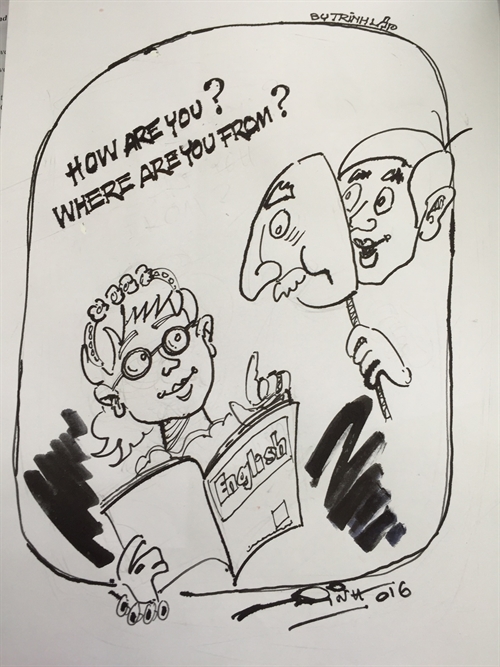 Talk Around Town
Talk Around Town

One man in Hà Nội decided to teach his daughter English by speaking to her in that language for three years. His efforts paid off as his daughter can now speak English fluently.
 |
By Trung Hiếu
One man in Hà Nội decided to teach his daughter English by speaking it to her for three years.
His efforts paid off as his daughter, five-year-old Huyền My, can now speak English as fluently as her Vietnamese.
When she meets her father or a foreigner, My speaks good English, and when she turns to her mother, she switches to Vietnamese.
She owes this ability to her parents, especially her father, Phạm Vinh, 34, who spent some time working in the United States.
When their daughter was born, they agreed that Vinh would speak English to his daughter and his wife would speak in Vietnamese.
“The reason for our decision was that during my years of studying abroad, I met a lot of mixed-race children who could speak two or three languages fluently from an early age, as they had often heard their parents speaking in these languages. These children could differentiate between the languages easily. Therefore, I decided I should let my baby practise bilingual, and the sooner the better,” he said, adding that he always ensured his daughter was happy while learning, just as she was while playing games.
Wherever they are, whether in the market, in a bookstore, on the street or by the sea, the father always speaks to his daughter in English.
"Many times, while our family was out shopping, I would speak English while my wife spoke Vietnamese, so the shop’s staff would look at us curiously. At first I was afraid, but I thought if I hesitate, my baby will become more afraid. So I took every opportunity to speak and explain things to her in English.”
Vinh and his wife also created thousands of learning cards in English and Vietnamese for their child.
"For the first two years, I kept speaking English, but my daughter spoke it very rarely. I even called my foreign friend once to express my helplessness, but he advised me not to be too concerned right now about how much the girl was absorbing. He told me this was just the stage of ’input’, into a receptive mind, so the more I educated her, the better it would be," Vinh recalled.
His efforts finally paid off in early 2015, while the family was holidaying in the coastal city of Nha Trang.
“While we were at the pool, a Western traveller said ’hello’ to my daughter, and she communicated with him very confidently. The foreign guests expressed surprise that my baby had always lived in Việt Nam but could speak English so well," Vinh said.
"The process of early learning requires parents to be extremely patient and enthusiastic. It could take only five to seven minutes per day, but if you skip a day, this could set back the child’s academic progress," he said.
Effective methods
Nguyễn Tuấn Hải, a professional intensive English language trainer and founder of the Eton Grammar English School and Reggio Emilia Hanoi Primary School, shared some ideas on how to teach children English effectively at home.
“When the child is three years old, the parents can teach him or her English at home. The best way to learn is through listening; that creates an environment of native pronunciation for the child, as the language gradually enters his/her brain in the form of audio signals,” he said.
Hải said an extremely effective method for children aged five to learn English was to tell them English stories through different media: sounds, images and text. “But parents should not let the child listen to the news," he warned.
However, some older people do not approve of children speaking English at home.
“We should not let children speak a foreign language too early at home,” Nguyễn Thanh Minh, a retired teacher, said.
“We should encourage the use of our mother tongue. Our society is currently complicated enough. I can’t imagine a Vietnamese family where everyone speaks English to each other.
“Moreover, I believe that if parents force their children to speak a foreign language too early, this may harm the development of their mind and soul. The child can also get confused by the different languages,” she said.
I myself believe we live in an era of integration, and English is an effective tool for international communication. So I support the idea of encouraging children to speak English at home.
But it is important for parents to never forget their children are Vietnamese. Thus, teaching them about Vietnamese culture, history and lifestyle is also essential. VNS




